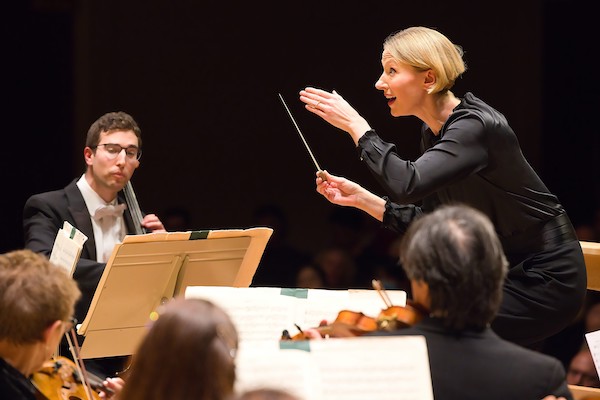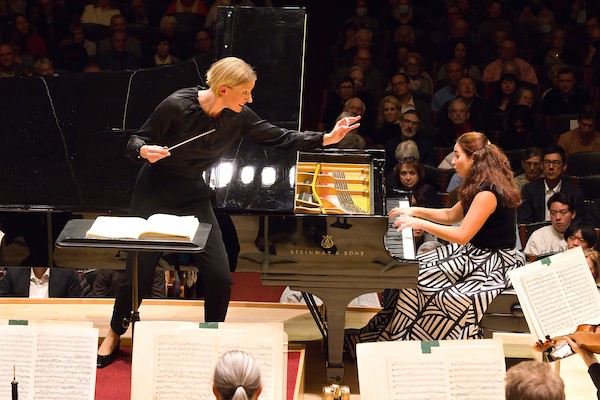Mallwitz strikes sparks with BSO in impressive American debut

Joana Mallwitz conducted the Boston Symphony Orchestra Thursday night in music of Schubert, Tchaikovsky and Kodaly. Photo: Hilary Scott
As a rule, Germans don’t do American-style hyperbole. So perhaps the billboards recently up in Berlin declaring conductor Joana Mallwitz “the next big thing” were meant more as statements of settled fact than as breathless advertising slogans.
It sure seems that way following the 37-year-old’s American debut leading the Boston Symphony Orchestra Thursday night at Symphony Hall. To be sure, the evening’s survey of pieces by Zoltán Kodály, Tchaikovsky, and Schubert was anything but fusty or dull.
Not that Mallwitz—who, as director of the Konzerthausorchester, is the first woman to lead a major Berlin ensemble—accomplishes things by drawing undue attention to herself: she’s no show-off Dirigentin. Yesterday, every beat, cue, and gesture was impeccably precise. Yet the conductor also seemed perfectly content at times to step back and, in a pointed contrast to BSO music director Andris Nelsons, just let the orchestra play.
This was a situation to which the ensemble responded with conspicuous enthusiasm. Indeed, for dynamic range, delicacy of balances, textural clarity, energy, purpose, and color, Thursday night’s concert offered the most consistently disciplined performance the BSO has given so far this season.
What’s more, under Mallwitz’s guidance, all of those qualities combined to serve clear and, often, invigorating expressive purposes. That was especially true in the evening’s traversal of Schubert’s “Great” C-major Symphony.
Completed sometime in 1826, the four-movement piece is perhaps as well-known for its duration (Robert Schumann praised its “heavenly” 50-minute runtime) as for its inexhaustible, if repetitious, melodic density. Favoring swift tempos, taut rhythms, and a shapely line, Mallwitz made one completely forget about the clock. Hers was, instead, an interpretation of riveting drive and sweep.
Granted, the first movement, though plush-toned and directed in its outer sections, largely disregarded the second part of its Allegro ma non troppo tempo indication. Yet the bright, snapping performance was infused with gripping balletic purpose. So was the limber Scherzo. Meanwhile, the finale’s pulsing bass line (especially in the coda), channeled another type of dance, sounding, for once, more than a little like an early anticipation of house music.
In contrast, Mallwitz treated the Andante as a study in strongly shifting characters: pert and swaggering to start, then winsome and, ultimately, tragic. The shades of color the conductor drew from the BSO forces—richly blended woodwinds, nobly plangent strings, blazing brasses—all served to illuminate the movement’s structure, culminating in a moment of shattering silence following its explosive climax.
Kodály’s Dances of Galánta doesn’t plumb such weighted emotional depths. Still, Thursday’s account of this Technicolor 1933 score was crisp, lucid, and well-blended. The BSO, playing the piece for the first time in more than a decade, imbued its soulful refrains and splashy embellishments with plenty of Romani zest and burnished tone.
Equally impassioned was the BSO debut of pianist Anna Vinnitskaya.

Anna Vinnitskaya performed Tchaikovsky’s Piano Concerto No. 1 with Joana Mallwitz and the BSO. Photo: Hilary Scott
A musician who combines the brawn of Yefim Bronfman with the poetic touch of Anna Fedorova, the Russian-born, Hamburg-based keyboardist was fully in command of the solo part in Tchaikovsky’s evergreen Piano Concerto No. 1. Though the somewhat brittle tone of her Steinway meant that parts of its outer movements took on a blunt edge, the rhythmic precision and dramatic focus of Vinnitskaya’s performance were absorbing.
That was especially the case in the concerto’s many inward moments. In them, the pianist exhibited both a strong understanding of musical narrative—the first movement’s potentially digressive episodes never meandered—and a gift for drawing out the melodic line. Wherever those emerged, the music’s lyrical solo moments all took flight, even in the blistering finale.
Mallwitz and the BSO were simpatico partners, playing with style, responsiveness, and resplendent lyricism. Though the second movement’s Prestissimo interlude sounded a touch delirious, the rest of the reading was well-judged in terms of tempo and tonal balance. Additionally, the Andante’s various solos were all gracefully dispatched.
Afterwards, the pianist offered more Tchaikovsky as an encore, this time an elegant rendition of “April” from The Seasons.
The program will be repeated 1:30 p.m. Friday and 8 p.m. Saturday at Symphony Hall. bso.org
Posted in Performances




Posted Nov 05, 2023 at 2:37 pm by Mike
I loved the concert on Thursday night. It was a magnificent performance.